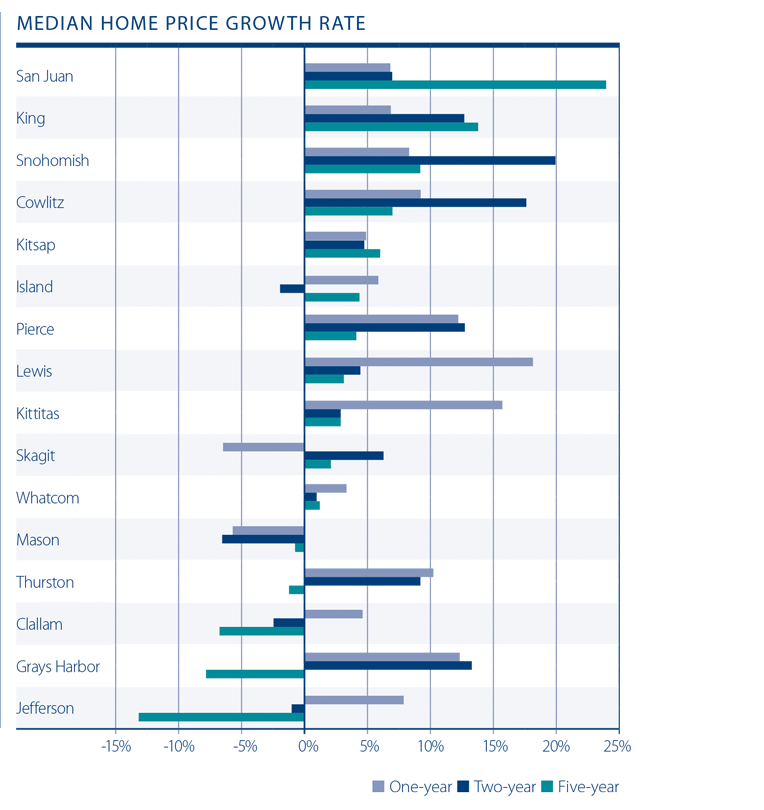Windermere Real Estate is proud to partner with Gardner Economics on this analysis of the Western Washington real estate market. This report is designed to offer insight into the realities of the housing market. Numbers alone do not always give an accurate picture of local economic conditions; therefore our goal is to provide an explanation of what the statistics mean and how they impact the Western Washington housing economy. We hope that this information may assist you with making an informed real estate decision. For further information about the real estate market in your area, please contact your Windermere agent.
Regional Economics
2014 was a pretty good year for the 15 counties covered in this report. In total, Western Washington added 65,710 jobs in 2014, up from the annual rate of 62,520 through the third quarter, which is a growth rate of 2.9 percent. For comparison purposes, the state as a whole grew by 2.7 percent and employment nationwide rose by 1.9 percent.
On a quarter-over-quarter basis, employment made an impressive jump as the market added 22,410 new jobs in the fourth quarter, up dramatically from the meager 3,100 jobs added in in the third quarter.
The tri-county area of King, Snohomish, and Pierce Counties continues to dominate in terms of total jobs as well as total growth rates, having added 53,400 jobs year-over-year, and a substantial 14,000 jobs in the fourth quarter.
King County continues to lead with 43,300 jobs added in 2014. This was followed by Pierce County which added 7,900 jobs, and Thurston County rounds out the top three with 3,600 jobs. Interestingly, no market saw its total employment level decline in 2014.
When looking at percentage growth rates, the small San Juan County area saw employment leap by 10.8 percent. This was followed by Cowlitz County (+4.1%) and Skagit County (+3.7%).
When we look at unemployment rates in the region, we note a change from the recent trend of declining unemployment across the entire region. At the end of 2014, the unemployment rate dropped in eight of the 15 counties surveyed. Two counties saw the rate remain static and five saw the rate rise.
This is not unusual for several reasons. Firstly, as markets improve, more people start to look for work and they are then counted as being unemployed. Secondly, we are starting to see growth in the total labor force, which can have a negative effect on the unemployment rate. I am not concerned about this, as the overall trend has been that of unemployment rates trending lower and I anticipate that this will continue as we move through 2015.
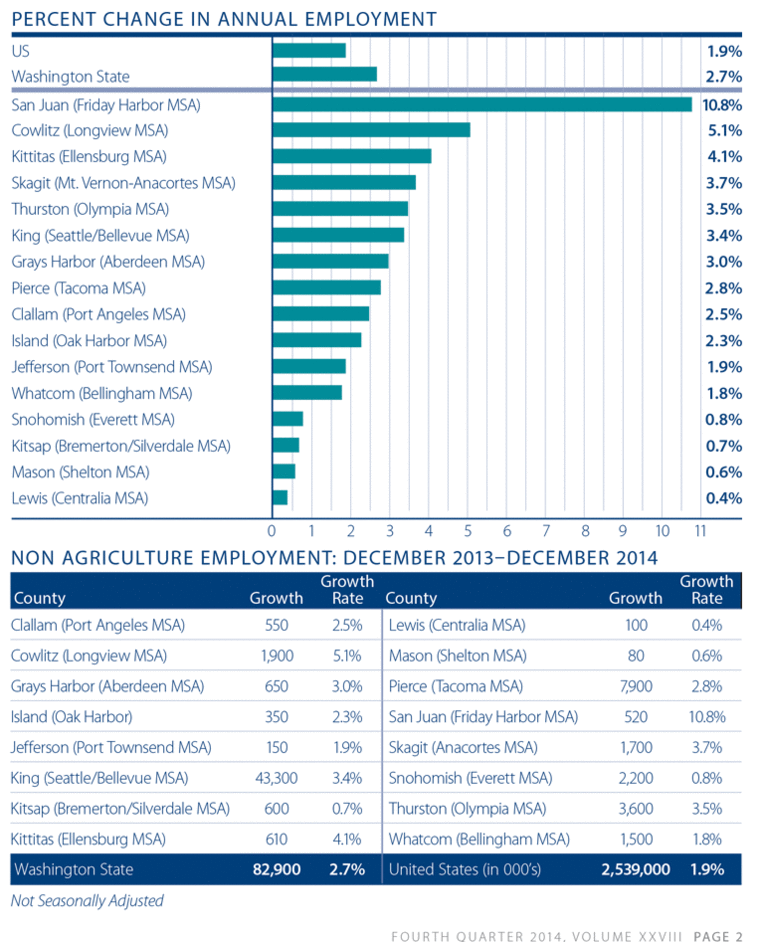
When compared to December of 2013, the greatest unemployment rate decline was seen in Grays Harbor County where the rate dropped by 1.1 percent. This was followed by Snohomish County with a drop of 0.9 percent, and King and Mason Counties saw their rates decline by 0.6 percent.
From an employment growth standpoint, Washington State and the counties contained in this report continue to outperform the nation as a whole. Smaller markets will always be subject to (potentially) wild fluctuations, but the overall trend has been positive for the last few years. Furthermore, I do not see any obvious obstacles that would suggest we are likely to see a slowing economy any time soon.
That said, I am going to maintain the “B+” grade that I have given the economy for over a year. We continue on the upswing but have yet to reach our full potential.
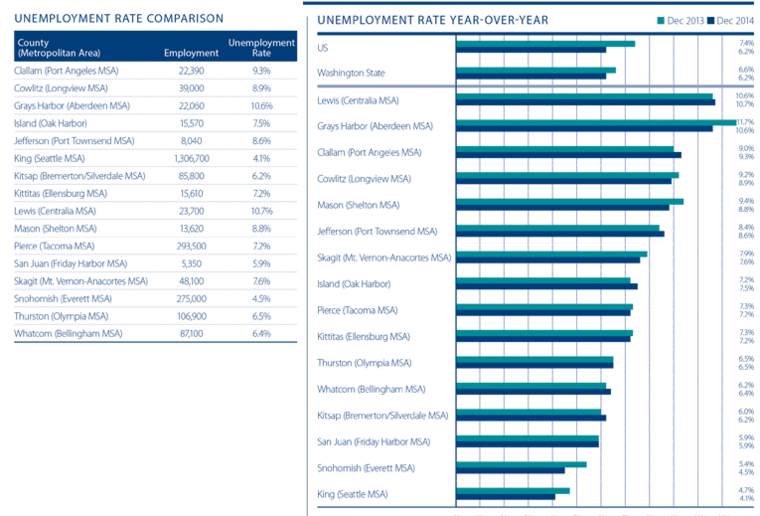
Regional Real Estate
The number of homes that were for sale at the end of 2014 was 9.7 percent lower than at the end of 2013, which is a little disappointing as it continues a trend that was seen at the end of the third quarter. The total number of listings in the counties covered by this report was measured at 14,219, compared to 15,743 a year ago. As a point of reference, in December 2009, there were 26,711 homes listed for sale. There is no doubt that the continued lack of homes for sale has many frustrated.
Interestingly enough, while inventory levels have continued to fall, home sales in 2014 actually rose. When we look at sales activity, 65,457 homes sold in 2014—an increase of 3.2 percent versus 2013. However, in fourth quarter there was an 18.6 percent drop in home sales compared to third quarter numbers. We can certainly attribute some of this to seasonality, but it was not the way I wanted to see the year end.
When we look at a year-over-year comparison, home sales grew the fastest in San Juan County (+38.3%), followed by Mason County (+26.1%), and Grays Harbor County (+17.5%). There were just two counties where annual home sales fell: King County (-0.6%) and Clallam County (-5.4%).
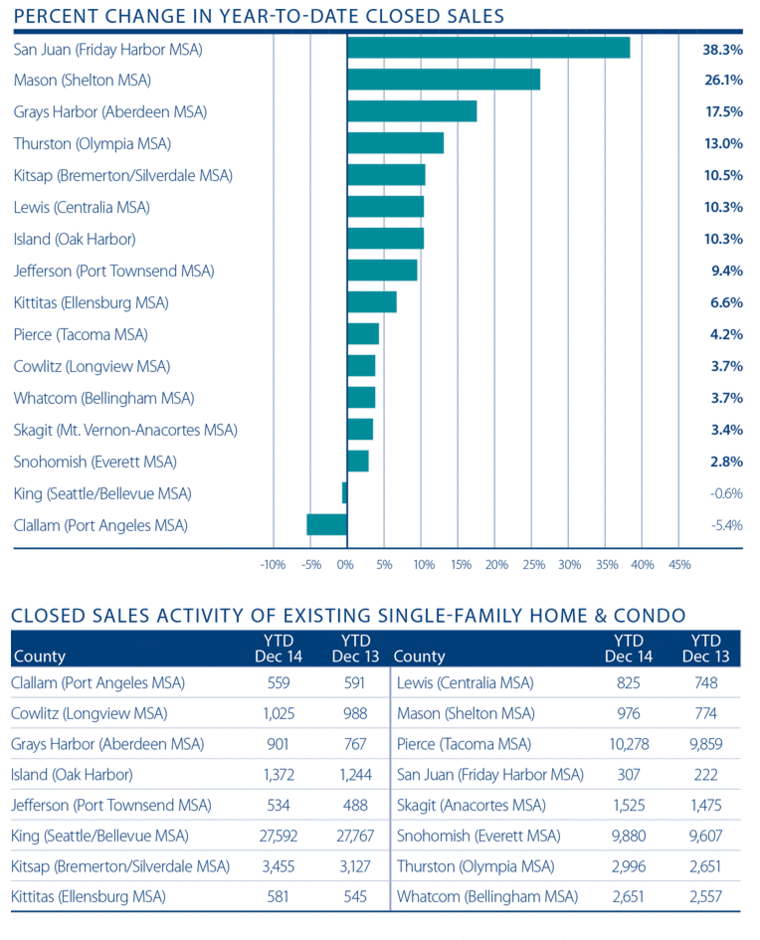
The weighted average home sale price in Western Washington in the fourth quarter was $350,667—an increase of 6.5 percent compared to 2013. As is seen in the chart to the right, all but two counties saw average prices go up. Price growth continues to moderate somewhat—which isn’t a bad thing— but remains above the U.S. as a whole.
The strongest annual gains during fourth quarter were in Lewis County where prices rose by 18.1 percent. There were also significant gains seen in Kittitas County (+15.7%), Grays Harbor County (+12.3%), Pierce County (+12.2%), and Thurston County (+10.2%). As for price declines, Skagit County had a loss of -6.5% and Mason County -5.7%.
Interest rates remain at close to historically low levels and the economy continues to chug along, but we need more homes for sale. As such, I am maintaining the “B+” grade that I gave the market in the third quarter.
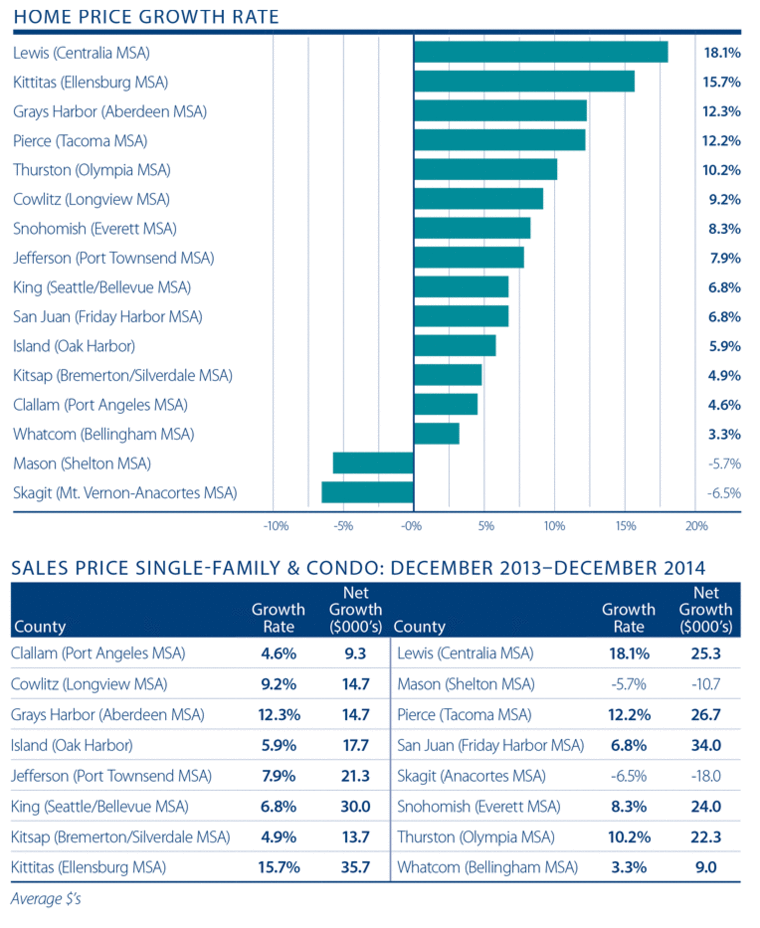
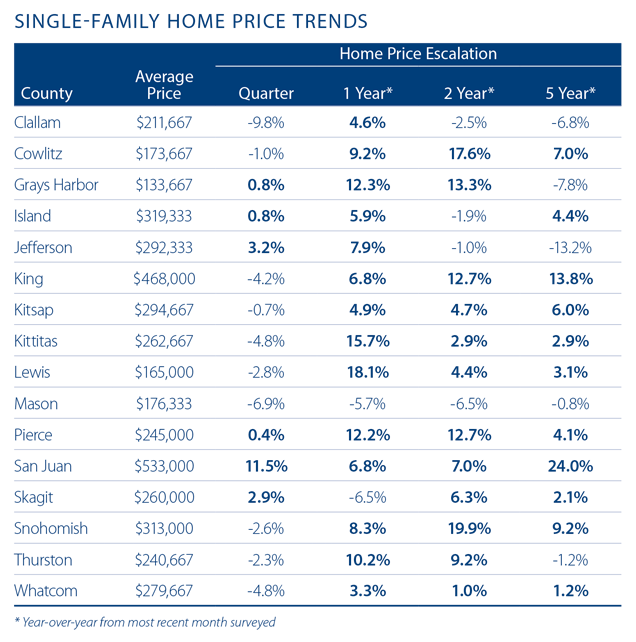
Conclusions
Our market continues to add jobs and our population continues to rise (+63,000 in 2014), both of which are very positive. However, our housing market continues to have a lack of homes for sale.
Will we see an increase in listings in 2015? That is the million dollar question. If not, then we might see builders going into overdrive in an attempt to address pent up demand.
Interest rates are going to rise in 2014, but not at excessively fast rates. By the end of 2015, I still expect to see the average 30-year fixed rate below five percent, but a lot closer to it than we stand today.
I expect to see home prices continue to appreciate in 2015, but at somewhat slower rates that are more sustainable over the long term. However, it is possible that price growth may continue to escalate faster than anticipated, even if we see the number of homes for sale increasing, if a higher proportion of those homes coming to market are high-end homes.
About Matthew Gardner
 Mr. Gardner is a land use economist and principal with Gardner Economics and is considered by many to be one of the foremost real estate analysts in the Pacific Northwest.
Mr. Gardner is a land use economist and principal with Gardner Economics and is considered by many to be one of the foremost real estate analysts in the Pacific Northwest.
In addition to managing his consulting practice, Mr. Gardner chairs the Board of Trustees at the Washington Center for Real Estate Research at the University of Washington; sits on the Urban Land Institutes Technical Assistance Panel; is an Advisory Board Member for the Runstad Center for Real Estate Studies at the University of Washington; and is the Editor of the Washington State University’s Central Puget Sound Real Estate Research Report.
He is also the retained economist for the Master Builders Association of King & Snohomish Counties. He has twenty-five years of professional experience in the U.K. and U.S.
He has appeared on CNN, NBC and NPR news services to discuss real estate issues, and is regularly cited in the Wall Street Journal and all local media.
 Facebook
Facebook
 X
X
 Pinterest
Pinterest
 Copy Link
Copy Link
